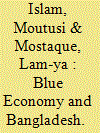|
|
|
Sort Order |
|
|
|
Items / Page
|
|
|
|
|
|
|
| Srl | Item |
| 1 |
ID:
165527


|
|
|
|
|
| Summary/Abstract |
In recent times, Blue Economy is emerging as an alternative development paradigm that balances economic use of oceans with environmental sustainability. With the depletion of land-based resources, countries around the world are turning their attention to the oceans as a new source of economic development and growth. Following the settlement of its maritime territory, Bangladesh is also working on utilizing oceanic resources with a view to becoming a developed country. In this backdrop, the paper is an attempt to examine the initiatives taken by different countries around the world to develop Blue Economy and identify important lessons that Bangladesh can learn from those experiences. The lessons include formulating a well-articulated Blue Economy plan, developing robust legal and institutional frameworks, emphasizing indigenous capacity development, prioritizing ocean research and innovation, protecting ocean environment as well as pursuing ‘Blue Diplomacy’ among others.
|
|
|
|
|
|
|
|
|
|
|
|
|
|
|
|
| 2 |
ID:
165529


|
|
|
|
|
| Summary/Abstract |
It is agreed by the academia that climate change is happening and according to the Intergovernmental Panel on Climate Change (IPCC), the reason is primarily anthropogenic. The focus of this study is the role of climate change as a threat multiplier in the context of Bangladesh. A conceptual framework presented by the United Nations Environment Programme (UNEP) linking climate change and security in the Sahel region is used as the basis of this study. The cases of Darfur and Nigeria, where impacts of climate change are liable for accelerating instability in the respective areas, are analyzed in details to get hold of the threats associated with climate change and implications of such threats for vulnerable states. According to many indices, Bangladesh is highly susceptible to changes in climatic events due to its unique geographic location and socio-economic condition. This paper finds that impacts of climate change stir up different phenomena that can multiply instability in Bangladesh. Moreover, such impacts may turn out to be oblique threats to national security of the country in the long run. Based on the findings of the research, this paper presents a new framework linking climate change with national insecurity and proposes that further study can improve the precision and usability of components affiliated with this framework.
|
|
|
|
|
|
|
|
|
|
|
|
|
|
|
|
| 3 |
ID:
165528


|
|
|
|
|
| Summary/Abstract |
Non-traditional Security (NTS) issues, in recent times, have drawn heightened global attention and achieved undeniable prominence. Since the end of the Cold War, the world has witnessed unprecedented events compelling scholars and analysts to conceptualize or re-conceptualize the changing nature of threats to security in an increasingly interdependent and complex world. The past decades have been stunned by increasing numbers of terrorist attacks, state failures, deadly epidemics, rapidly fluctuating world energy and food prices, a global economic meltdown, and extensive natural disasters like cyclones, earthquakes and flooding. All these events led to the development of an alternative paradigm of security, i.e., NTS that focuses less on conventional military threats which has largely been defined in geopolitical and geostrategic terms and confined to the relationships among nation-states and their military strengths. However, NTS, though is a popular concept, remains ambiguous within and outside the academia; and in whatever context the NTS issues are coined together, Bangladesh as a developing country surely faces numerous NTS threats. Hence, the country needs to prepare itself to counter the challenges emanating from a host of NTS threats it is facing now or likely to face in near future. Against this backdrop, the paper has endeavoured to provide a brief conceptual understanding of the term NTS by delineating different explanations of the concept by renowned scholars and experts. It is argued that NTS is a useful framework of analysis to operationalize the concept of security in economic, social, political and internal security contexts. The paper also provides some arguments as to the need for ‘prioritization’ in curbing various NTS threats of Bangladesh, given the country’s limited resources and capabilities. Keeping this point in view, the paper finds that Bangladesh is apparently managing the challenges well, but it needs to undertake proactive measures and policy options incorporating a dynamic and adaptive security framework, seek international cooperation and devise a comprehensive approach to meet the present and future NTS challenges of the country more effectively.
|
|
|
|
|
|
|
|
|
|
|
|
|
|
|
|
| 4 |
ID:
165530


|
|
|
|
|
| Summary/Abstract |
Global terrorism is a multi-dimensional concern. Nowadays, terrorists use multifaceted tactics in order to avoid various counterterrorism operations. In recent years, a comprehensive drone campaign by the United States and death of some top leaders pushed Al Qaeda, Islamic State and other terrorist groups to find out alternative ways to convey their messages to their followers and sympathizers. Terrorist groups are resorting to internet-based alternative media to spread terrorism. Internet is also helping terrorist groups in training, fundraising, recruiting manpower, planning and executing terrorist attacks. Lone-wolf terrorists are also taking advantage of internet-based media in communication technologies. Internet has brought a shift in the spectra of global terrorism. An understanding of the linkage between terrorism and internet-based alternative media can help in formulating a counterterrorism strategy. This paper examines the role of the internet-based alternative media in global terrorism and counterterrorism. The research finding suggests that terrorist groups are quite successful in using internet-based alternative media to reach their audiences. It is also evident that the internet also can play an important role in global counterterrorism efforts.
|
|
|
|
|
|
|
|
|
|
|
|
|
|
|
|
|
|
|
|
|